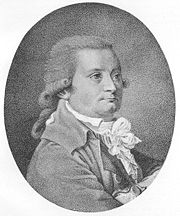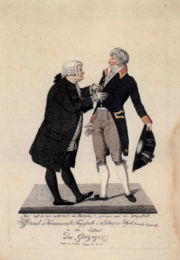
August Wilhelm Iffland
Encyclopedia


Germany
Germany , officially the Federal Republic of Germany , is a federal parliamentary republic in Europe. The country consists of 16 states while the capital and largest city is Berlin. Germany covers an area of 357,021 km2 and has a largely temperate seasonal climate...
actor
Actor
An actor is a person who acts in a dramatic production and who works in film, television, theatre, or radio in that capacity...
and dramatic
Drama
Drama is the specific mode of fiction represented in performance. The term comes from a Greek word meaning "action" , which is derived from "to do","to act" . The enactment of drama in theatre, performed by actors on a stage before an audience, presupposes collaborative modes of production and a...
author
Author
An author is broadly defined as "the person who originates or gives existence to anything" and that authorship determines responsibility for what is created. Narrowly defined, an author is the originator of any written work.-Legal significance:...
. His father intended him to be a clergyman
Clergy
Clergy is the generic term used to describe the formal religious leadership within a given religion. A clergyman, churchman or cleric is a member of the clergy, especially one who is a priest, preacher, pastor, or other religious professional....
, but Iffland preferred the stage, and at eighteen ran away to Gotha
Gotha (town)
Gotha is a town in Thuringia, within the central core of Germany. It is the capital of the district of Gotha.- History :The town has existed at least since the 8th century, when it was mentioned in a document signed by Charlemagne as Villa Gotaha . Its importance derives from having been chosen in...
in order to prepare himself for a theatrical career.
He was fortunate enough to receive instruction from Hans Ekhof, and made such rapid progress that he was able to accept an engagement at the theater in Mannheim
Mannheim
Mannheim is a city in southwestern Germany. With about 315,000 inhabitants, Mannheim is the second-largest city in the Bundesland of Baden-Württemberg, following the capital city of Stuttgart....
in 1779, beginning his rise into prominence. He soon stood high in his profession, and enhanced his reputation by frequently playing in other towns. In 1796 he settled in Berlin
Berlin
Berlin is the capital city of Germany and is one of the 16 states of Germany. With a population of 3.45 million people, Berlin is Germany's largest city. It is the second most populous city proper and the seventh most populous urban area in the European Union...
, where he became director of the national theater of Prussia
Prussia
Prussia was a German kingdom and historic state originating out of the Duchy of Prussia and the Margraviate of Brandenburg. For centuries, the House of Hohenzollern ruled Prussia, successfully expanding its size by way of an unusually well-organized and effective army. Prussia shaped the history...
, and in 1811 he was made general director of all presentations before royalty.
Iffland produced the classical works of Goethe
Johann Wolfgang von Goethe
Johann Wolfgang von Goethe was a German writer, pictorial artist, biologist, theoretical physicist, and polymath. He is considered the supreme genius of modern German literature. His works span the fields of poetry, drama, prose, philosophy, and science. His Faust has been called the greatest long...
and Schiller
Friedrich Schiller
Johann Christoph Friedrich von Schiller was a German poet, philosopher, historian, and playwright. During the last seventeen years of his life , Schiller struck up a productive, if complicated, friendship with already famous and influential Johann Wolfgang von Goethe...
with conscientious care, but he had little understanding for the drama of the romantic
Romanticism
Romanticism was an artistic, literary and intellectual movement that originated in the second half of the 18th century in Europe, and gained strength in reaction to the Industrial Revolution...
writers. The form of play in which he was most at home, both as an actor and playwright, was the domestic drama, the sentimental play of everyday life. His works show little imagination, but they display a thorough mastery of the technical necessities of the stage, and a remarkable power of devising effective situations. His best characters are simple and natural, fond of domestic life, but too much given the utterance of commonplace sentimentality.
His best-known plays are Die Jäger, Dienstpflicht, Die Advokaten, Die Mündel and Die Hagstolzen. Iffland was also a dramatic critic, and German actors placed high value on his reasonings and hints about their works in his Almanach für Theater und Theaterfreunde. During 1798–1802 he issued his Dramatischen Werke in sixteen volumes, to which he added an autobiography (Meine theatralische Laufbahn). During 1807–1809 Iffland put out two volumes of Neue dramatische Werke. Selections from his writings were later published, one in two volumes, the other in ten volumes.
As an actor, he was conspicuous for his brilliant portrayal of comedy
Comedy
Comedy , as a popular meaning, is any humorous discourse or work generally intended to amuse by creating laughter, especially in television, film, and stand-up comedy. This must be carefully distinguished from its academic definition, namely the comic theatre, whose Western origins are found in...
parts. His fine gentlemen, polished men of the world, and distinguished princes were models of perfection, and showed none of the traces of elaborate study which were present in his interpretations of tragedy
Tragedy
Tragedy is a form of art based on human suffering that offers its audience pleasure. While most cultures have developed forms that provoke this paradoxical response, tragedy refers to a specific tradition of drama that has played a unique and important role historically in the self-definition of...
. He especially excelled in presenting the types of middle-class life that appear in his own comedies.
Iffland died in Berlin on 22 September 1814. He is buried in the Jerusalems- und Neue Kirche Friedhof II (Cemetery No. II of the Jerusalem's Church
Jerusalem's Church
Jerusalem's Church is one of the churches of the Evangelical Congregation in the Friedrichstadt , a member of the Protestant umbrella organisation Evangelical Church of Berlin-Brandenburg-Silesian Upper Lusatia. The present church building is located in Berlin, borough Friedrichshain-Kreuzberg, in...
and New Church
Deutscher Dom
Deutscher Dom is the colloquial naming for the New Church located in Berlin on the Gendarmenmarkt across from Französischer Dom . Its parish comprised the northern part of the then new quarter of Friedrichstadt, which until then belonged to the parish of the congregations of Jerusalem's Church...
) in Berlin-Kreuzberg
Kreuzberg
Kreuzberg, a part of the combined Friedrichshain-Kreuzberg borough located south of Mitte since 2001, is one of the best-known areas of Berlin...
. A bronze portrait statue of him was erected in front of the Mannheim theater in 1864. A street in Berlin is named after him.
The Iffland-Ring
Iffland-Ring
The Iffland-Ring is a diamond-studded ring with the picture of August Wilhelm Iffland ....
bears Iffland's likeness, and is borne by the most important German
German language
German is a West Germanic language, related to and classified alongside English and Dutch. With an estimated 90 – 98 million native speakers, German is one of the world's major languages and is the most widely-spoken first language in the European Union....
-speaking actor, as decided by his predecessor.

